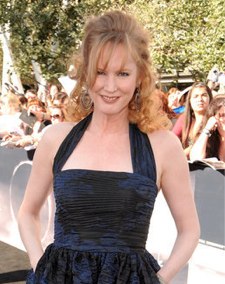Eclipse Screenwriter Melissa Rosenberg on Fans: 'They're Coming After Me a Little Bit Already!'
 In many ways, Melissa Rosenberg has the Twilight franchise's most difficult job: as screenwriter, she has to satisfy not just the original novelist Stephenie Meyer, but the actors (including Kristen Stewart, who famously won't say a line if she doesn't believe it), directors, and fans, too. The imminent Eclipse is her third crack at the series, and up next is the very controversial Breaking Dawn, which Rosenberg is busily splitting into two movies.
In many ways, Melissa Rosenberg has the Twilight franchise's most difficult job: as screenwriter, she has to satisfy not just the original novelist Stephenie Meyer, but the actors (including Kristen Stewart, who famously won't say a line if she doesn't believe it), directors, and fans, too. The imminent Eclipse is her third crack at the series, and up next is the very controversial Breaking Dawn, which Rosenberg is busily splitting into two movies.
In a candid interview with Movieline, Rosenberg discussed fan frustrations, her thoughts on Summit's director selections, and just how she pictures that Breaking Dawn split.
You've worked with three different directors on this series, and you're about to work with a fourth. How different has the process been with each of them?
For me, coming out of television, it's standard operating procedure for the writers to be the constant and the directors to rotate in and out. It's actually sort of like an extended television experience, so it feels very natural to me. I'm being absolutely honest here: I've had really good luck with these directors. I think Summit just chooses directors really well, at least from a writer's standpoint. They're very different, but the one constant has been that they all respect my process and the writing. They're all very different.
How was Catherine Hardwicke different than Chris Weitz?
With Catherine, we had a very short period to write, so there was a lot of interaction. I was hot off the presses -- she'd give me notes and I'd give her pages right back. There was a lot of collaboration. With Chris, the scripts were done when he came on, so I basically handed them off and ran off to the next script while he went off and shot it and did all the production rewrites since he's a writer as well.
And David Slade?
David is probably the most traditional collaboration in that I finished the script before he came on, and then it was about tailoring it to him. He does a lot of storyboarding, so he would have something completely boarded out -- like, I would write the action sequences, he goes and storyboards what he wants to do with it, he comes back, and I adjust. There was a lot of that really fun collaboration. By the time he gets on set, the script is what he's going to shoot. He has what he needs to shoot.
How much have you been privy to the directors that Summit wants to hire?
I get a few inside tracks, but I'm mostly out of that process. There's a couple where I was like, "Oh no. God. Don't choose them."
What did you think when you heard they were looking at Gus Van Sant and Sofia Coppola for Breaking Dawn?
Summit's a really creative place. They reach out -- I mean, they found me. Not that I'm not creative or anything, but they found me in television. They don't have to get that guy who wrote Iron Man. They had Catherine, they had Anne Fletcher on Step Up... they'll break new directors or writers according to their own creative tastes. But honestly, when they were talking about Sofia Coppola and Gus Van Sant, I was like, "Really? For [movies] 4 and 5, we're going to get people of that level?" And then they got Bill Condon, and I was like, "Man, this isn't going to be just blowing off the last two in the series. They want these to be good. Oh my gosh, I'd better step up!" [Laughs]
And Bill Condon is a writer as well. What kind of situation is it for you as a screenwriter when you're working with a director who also writes -- do they want ownership of the script, too?
You know, it could go either way. I've certainly worked in both situations, but the fact that Bill's a writer, and I think a writer first...his notes have been the kind of notes you get from another writer, which are the best kind of notes. Character, theme, depth, complexity...it's not just, "Let's get that action set piece!" He's really talking about the core of the story. He's like, "I want you to write these movies." He doesn't want to write these movies. Rather than just taking them and doing what he would do, I think he's really more sensitive than most would be to what I need to do to make these great. He knows exactly how to give that to me. It's sort of like an actor directing actors -- sometimes, they make the best directors. A writer directing a writer could be a disaster -- "Oh my God, they took the movie from me" -- or it could be absolutely perfect, and so far, it's been perfect.
Pages: 1 2
